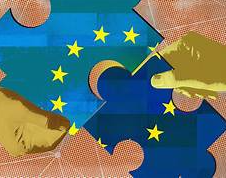This is just the start of Marine Le Pen and Giorgia Meloni’s plot to remake the continent.
The European Union was established primarily to prevent future wars between France and Germany, two former enemies that, through cooperation, became the pillars of the EU’s structure. France has traditionally taken the lead on political matters, while Germany’s growing wealth provided the financial backbone. This Franco-German alliance has steered EU affairs for decades, ensuring that all significant decisions pass through their joint approval before being incorporated into national legislation. However, in recent years, the motor of the Union has sputtered, largely due to strained relations between French President Emmanuel Macron and German Chancellor Olaf Scholz. Their diplomatic disagreements have undermined the once seamless operation of EU governance, with both leaders only recently offering vague promises of renewed collaboration.
Despite these tensions, the Franco-German axis has remained vital to the EU’s operations. It has traditionally been seen as the central mechanism driving European integration, from policy formation to economic alignment. But now, as new political forces gain ground across Europe, this longstanding power balance is being tested. The rise of far-right movements, championed by figures like Marine Le Pen of France and Giorgia Meloni of Italy, marks a challenge not only to the political center but to the very foundations of the EU itself.
Le Pen and Meloni, whose influence has expanded in recent years, represent the new wave of European populism that is increasingly vocal and organized. Together, they have the potential to reshape the EU’s political landscape, advocating for policies that threaten the current framework. Their opposition to Brussels’ centralized power and regulations has gained significant traction, as both leaders tap into the growing discontent with the EU’s bureaucratic structure. With their nationalist and Eurosceptic platforms, they aim to weaken the Union’s control, advocating for more sovereignty and autonomy for individual member states.
Their challenge to Brussels is not just a theoretical one; it’s becoming a tangible political force that could disrupt the European balance of power. As these leaders gain influence in their respective countries, they are also building alliances with other far-right leaders across the continent, strengthening their capacity to challenge the EU’s political order. This alliance, though still in its early stages, could represent a fundamental shift in European politics if it succeeds in mobilizing enough public support to undermine the EU’s traditional power structure.
The implications of this growing right-wing bloc could be profound. The EU, long a bastion of liberal democratic values, is now facing an existential challenge from within. As the influence of Le Pen, Meloni, and their allies expands, their ability to challenge the EU’s governance model will grow stronger, leading to a potential realignment of power in Europe. This marks the beginning of what could be a long and difficult battle for the future of the European Union.
While Macron and Scholz may attempt to reaffirm their leadership in the face of this rising populism, the growing influence of the New Right across Europe suggests that their efforts may not be enough to maintain the EU’s established political framework. As the new right-wing alliance seeks to reshape the EU, the continent’s political future appears increasingly uncertain, with the very future of the Union itself at stake.

